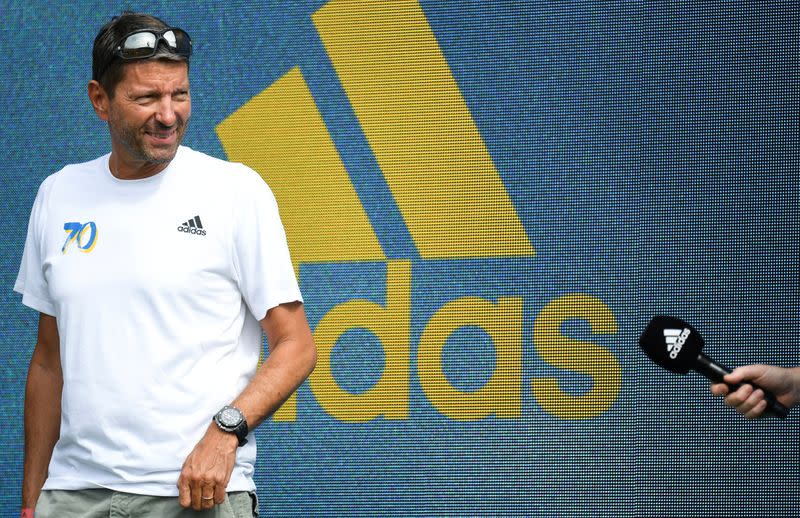Adidas sees $1.1 billion coronavirus hit to China sales, Puma warns on profit

By Emma Thomasson
BERLIN (Reuters) - German sportswear makers Adidas <ADSGn.DE> and Puma <PUMG.DE> warned on Wednesday of a major decline in sales in China due to the coronavirus and said while there were early signs of improvement there the impact had spread to other markets.
Shares in Adidas and Puma, already pummelled in the last few weeks, were down 10% and 3.2% respectively at 1509 GMT. Shares in market leader Nike <NKE.N>, which also warned last month of an impact from the virus, were down 3%.
Adidas said it expected first-quarter sales to drop by up to 1 billion euros ($1.1 billion) in greater China, and overall to fall more than 10%, including a drop of about 100 million euros in Japan and South Korea.
Chief Executive Kasper Rorsted, noting that the higher-margin China business is usually a major contributor to profits, told analysts that group operating profit will fall by more than 500 million euros in the same period,
Adidas and Puma make almost a third of their sales in Asia, which has been a major growth market for sporting goods in recent years. The region is also the main sourcing hub, with China a major producer for the industry.
"The virus hit looks worse than feared," Jefferies analyst James Grzinic wrote in a note on Adidas, adding that the news from Adidas and Puma pointed to the likelihood of major earnings downgrades for other retailers.
Puma said it no longer expected its business would return to normal soon, despite encouraging signs coming out of China, adding it was abandoning the 2020 guidance it gave on Feb. 19 that had assumed the crisis would be short-lived.
"Given the duration of the situation in China, the negative impact in other Asian countries and now also the spread to Europe and the U.S., we unfortunately have to conclude that a short-term normalization will not occur," it said.
Since emerging in China late last year, the new coronavirus has spread around the world, infecting around 120,000 people, killing nearly 4,300 and sending markets into a tailspin.
SPORTS EVENTS DISRUPTED
Sporting events around the world have been cancelled, postponed or played without spectators, with the virus's spread raising questions about the viability of the upcoming Olympic Games in Japan and Euro 2020 soccer championship.
While the Olympics is not usually a major driver of sales for the sporting goods industry, Euro 2020 is more important for sales of replica jerseys and balls.
If both events are postponed, Adidas could lose up to 70 million euros of sales, Rorsted told journalists, but added he was upbeat about the underlying health of the business and was not planning any job cuts.
Adidas, which last month warned its business in the greater China area had dropped by about 85% year-on-year in the period since China's Lunar New Year on Jan. 25, said about half of its 12,000 stores in China were open again.
But both companies noted a deterioration in markets such as Japan and South Korea, where Chinese tourists often travel to shop, and in Europe.
Adidas Finance chief Harm Ohlmeyer said he expects a return to normal in the second half of the year, adding that the company had not yet cut orders to factories.
Adidas and Puma said most of their factories in China were operating again. Puma said its outbound logistics from China were also mostly in operation, so its global supply chain was only seeing some minor delays.
Excluding the impact from the virus, Adidas forecast currency-neutral sales to increase by between 6% and 8% for the full year and for its operating margin to rise by between 10.5% and 11.8%.
Fourth-quarter sales - covering a period before the coronavirus took hold - rose a currency-adjusted 10% to 5.84 billion euros, while operating profit came in at 245 million euros, missing analysts' mean forecasts.
Currency-neutral sales grew 18% in greater China, 10% in North America and 14% in Europe, the latter a big rebound from declines in the first half of 2019 after the firm took steps to reduce its reliance on its Originals fashion line.
(Editing by Andrew Cawthorne and Mark Potter, Kirsten Donovan)
